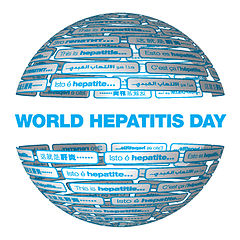World Hepatitis Day
| World Hepatitis Day | |
|---|---|

The World Hepatitis Day logo is the global symbol for encouraging better awareness, action, and support to prevent and treat viral hepatitis.
|
|
| Date | 28 July |
| Next time | 28 July 2017 |
| Frequency | annual |
World Hepatitis Day, observed on July 28 every year, aims to raise global awareness of hepatitis — a group of infectious diseases known as Hepatitis A, B, C, D, and E — and encourage prevention, diagnosis and treatment. Hepatitis affects hundreds of millions of people worldwide, causing acute and chronic disease and killing close to 1.4 million people every year.
World Hepatitis Day is one of eight official global public health campaigns marked by the World Health Organization (WHO), along with World Health Day, World Blood Donor Day, World Immunization Week, World Tuberculosis Day, World No Tobacco Day, World Malaria Day and World AIDS Day.
Approximately 500 million people worldwide are living with either hepatitis B or hepatitis C. If left untreated and unmanaged, hepatitis B or C can lead to advanced liver scarring (cirrhosis) and other complications, including liver cancer or liver failure. While many people worry more about contracting AIDS than hepatitis, the reality is that every year 1.5 million people worldwide die from either hepatitis B or C faster than they would from HIV/AIDS.
Hepatitis groups, patients and advocates worldwide take part in events on 28 July to mark the occasion. Notably in 2012, a Guinness World Record was created when 12,588 people from 20 countries did the Three Wise Monkeys actions on World Hepatitis Day to signify the willful ignorance of the disease.
...
Wikipedia
